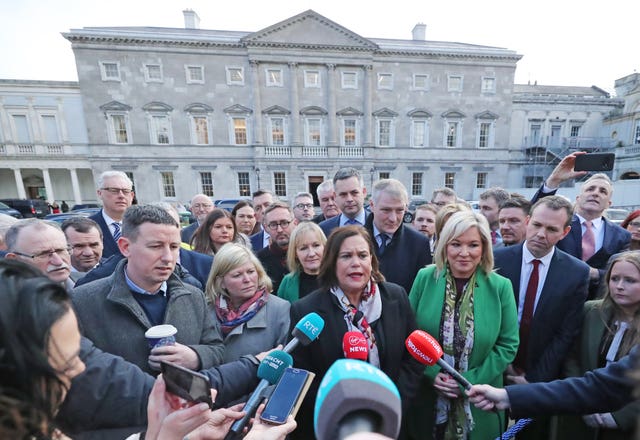Fianna Fail leader not ruling out new poll as party rejects Sinn Fein coalition
Micheal Martin said he would not rule out another general election.

Ireland’s largest party Fianna Fail has agreed not to go into coalition with Sinn Fein following a four-hour meeting of its parliamentary party.
The decision is likely to stop Sinn Fein entering power for the first time, as their leader Mary Lou McDonald said forming a coalition without them or Fine Gael would be “very, very tricky”.
Fianna Fail leader Micheal Martin told RTE news he would not rule out another general election.
He said: “In terms of the future, I can’t be certain how all of this is going to work. It will be very difficult.
Mr Martin said people cannot underestimate the strength of Fianna Fail’s opposition to going into government with Sinn Fein, and said they will enter into talks with smaller parties such as the Social Democrats, Labour and the Green Party in the coming days.
He added: “Beyond that, I don’t see anything substantive happening before next week.”
Speaking after the Fianna Fail parliamentary party meeting, TD Marc MacSharry said there was “overwhelming support” for the party’s position on Sinn Fein.
“There was overwhelming support for the position that the compatibility with Sinn Fein policy is not possible for us to work with,” he said.
“We totally respect the mandate and the people who voted for them, but from a policy point of view it is just not possible to be in government with them.”
Mr MacSharry added there was unanimous support among party members for Mr Martin to remain as party leader.
Ms McDonald said the time for other parties to say they would not speak to them about forming a government was over, following the party’s election success.
Fine Gael and Fianna Fail have repeatedly ruled out going into government with Sinn Fein, as talks begin this week to try to form a coalition government.
Fianna Fail won the most seats with 38, but Sinn Fein won 37 seats and the highest proportion of first preference votes following Saturday’s general election.
Speaking in Dublin following a meeting of the new Sinn Fein parliamentary party, Ms McDonald said: “We are stepping our way through a process where we work out what this government for change might look like.

“I have written to Micheal Martin and have not had any response to that correspondence, but I hope to meet with him.
“There are huge differences between ourselves and Fianna Fail.
“The question that arises in the midst of all of this is whether or not Fianna Fail can actually be a part of and commit to that appetite for change and good delivery for citizens on the ground.
“Micheal Martin has adopted a position that I believe is so far untenable, to say that he would not speak to us.
“We represent such a significant section of Irish opinion and I think anybody who followed and participated in the election cannot have missed the appetite for change, it was writ large – everybody agreed that that was fundamentally the theme of the election.”
Speaking on Thursday morning, Ms McDonald said: “We are not like those in politics for power or status. We’re not like those that have spent decades in government serving their own interests.
“That is old politics, that is politics of the past – where government came and went but the age-old problems remain.
“That they will ignore the democratic mandate, but that stance has run out of road. Those days are over, now is the moment for change, now is our time.”
She said a referendum on Irish unity was a key part of the Good Friday Agreement and preparations must begin.
“It is a duty of the Irish government to commence this process. Unionists should not fear a debate and discussions about the future,” she said.
Taoiseach Leo Varadkar said on Wednesday that he expected to be the leader of the opposition in the next Irish parliament, meaning Fianna Fail and Sinn Fein were the most likely coalition partners.
Mr Varadkar said “anything is possible” in the coming weeks, including a second election, but added it would “not be good for the country”.





